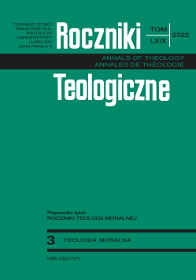Macierzyństwo zastępcze w kontekście technik sztucznej prokreacji. Ocena w świetle doktryny moralnej Kościoła katolickiego
Abstrakt
Macierzyństwo zastępcze staje się coraz częściej używaną metodą prokreacji przy wykorzystaniu nowoczesnych technologii reprodukcyjnych. Umożliwia „odbycie ciąży” przez kobietę w imieniu jednej lub kilku osób, które będą rodzicami nienarodzonego dziecka. W artykule podjęto próbę oceny zjawiska z punktu widzenia Kościoła katolickiego, przedstawiając macierzyństwo zastępcze w kontekście wykorzystywania technik sztucznego zapłodnienia/zapłodnienia in vitro wraz z przeniesieniem powstałego zarodka do macicy matki zastępczej z zamysłem oddania narodzonego dziecka innej osobie lub parze (także dwóm osobom tej samej płci), które „zleciły” tę procedurę.
Kościół katolicki wyraża dezaprobatę dla macierzyństwa zastępczego, podkreślając, że sprzeciwia się ono godności człowieka i degeneruje wartość macierzyństwa/ojcostwa. Nie bierze pod uwagę komplementarności płci oraz wzajemnego poszanowania prawa współmałżonków do tego, by stać się ojcem lub matką wspólnie z drugim małżonkiem. Pozbawia także dziecko prawa bycia poczętym w małżeństwie jako owoc specyficznego aktu miłości między małżonkami. Ta praktyka jest również postrzegana jako dehumanizująca, ponieważ traktuje matkę zastępczą jako „swoiste ludzkie narzędzie wykorzystywane do celów reprodukcji”.
Bibliografia
Biały, Stanisław. «Macierzyństwo zastępcze jako plan subrogacji praw do dziecka wbrew zasadom sprawiedliwości i miłości». Studia nad Rodziną UKSW 42, n. 1 (2017)1: 65–83.
Bianchini, Daniela. «No alla maternità surrogata: la Cassazione dubita» (6 maggio 2020). International Family News (IFN). Consultato 19 novembre 2021. https://ifamnews.com/it/no-alla-maternita-surrogata-la-cassazione-dubita.
Cassano, Giuseppe. Le nuove frontiere del diritto di famiglia: il diritto a nascere sani, la maternità surrogata, la fecondazione artificiale eterologa, la fecondazione artificiale post mortem. Milano: Giuffrè editore, 2000.
Catechismo della Chiesa Cattolica. Città del Vaticano: Libreria Editrice Vaticana, 1992.
Congregazione per la Dottrina della Fede. ««Dichiarazione Persona Humana circa alcune questioni di etica sessuale». Acta Apostolicae Sedis 68 (1976).
Congregazione per la Dottrina della Fede. «L’istruzione: Il rispetto della vita umana nascente e la dignità della procreazione Donum vitae» (22 febbraio 1987). La Santa Sede. Consultato 19 novembre 2021. http://www.vatican.va/roman_curia/congregations/cfaith/documents/rc_con_cfaith_doc_19870222_respect-for%20human-life_it.html.
Corti, Ines. La maternità per sostituzione. Milano: Giuffré editore, 2000.
Cozzoli, Mauro. «L’embrione umano: aspetti etico-normativi». In Identità e statuto dell’embrione umano, a cura di Pontificia Academia Pro Vita, 237–273. Città del Vaticano: Libreria Editrice Vaticana, 1998.
Faraoni, Alicia B. La maternità surrogata: la natura del fenomeno, gli aspetti giuridici, le prospettive di disciplina. Milano: Giuffrè editore, 2002.
Fondazione Merck Serono. «Biopsia testicolare e recupero di spermatozoi» (22 maggio 2018). Fondazione Merck Serono. Consultato 4 dicembre 2021. https://www.fondazioneserono.org/fertilita/ultime-notizie-fertilita/biopsia-testicolare-recupero-spermatozoi/.
Francesco. «Discorso ai partecipanti alla Plenaria del Pontificio Consiglio della Cultura», Città del Vaticano, 18 novembre 2017. La Santa Sede. Consultato 15 novembre 2021. https://w2.vatican.va/content/francesco/it/speeches/2017/november/documents/papa-francesco_20171118_plenaria-cultura.html.
Francesco. «Esortazione Apostolica post-sinodale Amoris laetitia sull’amore nella famiglia» (19 marzo 2016). La Santa Sede. Consultato 15 novembre 2021. https://www.vatican.va/content/francesco/it/apost_exhortations/documents/papa-francesco_esortazione-ap_20160319_amoris-laetitia.html.
Giovanni Paolo II. «Discorso ai partecipanti alla 35a Assemblea Generale dell’Associazione Medica Mondiale» (29 ottobre 1983). Acta Apostolicae Sedis 76 (1984).
Johnson, L. Syd M.: «Breeders: A Subclass of Women? Directed by Jennifer Lahl and Matthew Eppinette (review)». International Journal of Feminist Approaches to Bioethics 7, no. 2 (2014): 248–253.
Kobyliński, Andrzej. «Prymat techniki nad moralnością? Aspekty etyczno-prawne macierzyństwa zastępczego». Studia Ecologiae et Bioethicae 15, n. 2 (2017): 49–61.
Marinelli, Fabrizio. Scienza e storia del diritto. 3ª ed. Roma, Bari: Laterza, 2012.
Miranda, Gonzalo. «L’adozione prenatale nella Dignitas personae». Studia Bioethica 2, n. 1 (2009): 58–65.
Nawrot, Oktawian. «Macierzyństwo zastępcze – aspekty moralno-prawne». Etyka 33 (2000): 175–194.
Paolo VI. «Lettera Enciclica Humanae vitae» (25 luglio 1968). La Santa Sede. Consultato 16 novembre 2021. https://www.vatican.va/content/paul-vi/it/encyclicals/documents/hf_p-vi_enc_25071968_humanae-vitae.html.
Pontificio Consiglio della Giustizia e della Pace. «Compendio della Dottrina Sociale della Chiesa». La Santa Sede. Consultato 16 novembre 2021. https://www.vatican.va/roman_curia/pontifical_councils/justpeace/documents/rc_pc_justpeace_doc_20060526_compendio-dott-soc_it.html.
Pontificio Consiglio per gli Operatori Pastorali (per la Pastorale della Salute). Nuova Carta degli Operatori Sanitari. Città del Vaticano: Libreria Editrice Vaticana, 2016.
La Santa Sede. «Carta dei diritti della famiglia». L’Osservatore Romano, 25 novembre 1983.
Santosuosso, Fernando. La procreazione medicalmente assistita. Commento alla Legge 19 Febbraio 2004 n. 40. Milano: Giuffré editore, 2004.
Silva-Ruiz, Pedro F. «Macierzyństwo zastępcze – przegląd prawnoporównawczy». Ruch Prawniczy, Ekonomiczny i Socjologiczny 53, fasc. 4 (1991): 123–132.
Tiliacos, Nicoletta. «Una liberal nell’India degli uteri in affitto, alla scoperta della schiavitù». Il Foglio, 19 marzo 2014.
U.K. Department of Health and Social Security. Report of the Committee of Inquiry into Human Fertilisation and Embryology. London: Her Majesty’s Stationery Office, 1984.
Witczak-Bruś, Paulina. Surogacja. Aspekty prawne macierzyństwa zastępczego. Warszawa: Wolters Kluwer, 2021.
Zegers-Hochschild, F., G.D. Adamson, J. de Mouzon, O. Ishihara, R. Mansour, K. Nygren, E. Sullivan, e S. van der Poel. «International Committee for Monitoring Assisted Reproductive Technology (ICMART) and the World Health Organization (WHO) revised glossary of ART terminology». Fertility and Sterility 92, n. 5 (2009): 1520–1524.
Copyright (c) 2022 Roczniki Teologiczne

Utwór dostępny jest na licencji Creative Commons Uznanie autorstwa – Użycie niekomercyjne – Bez utworów zależnych 4.0 Międzynarodowe.





